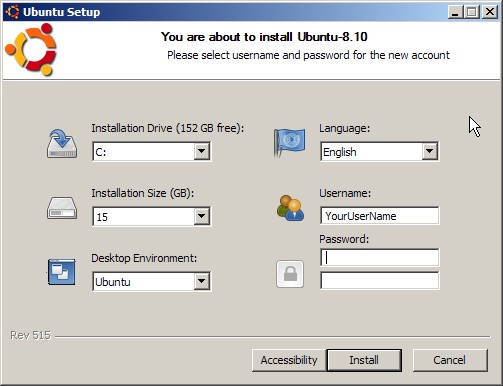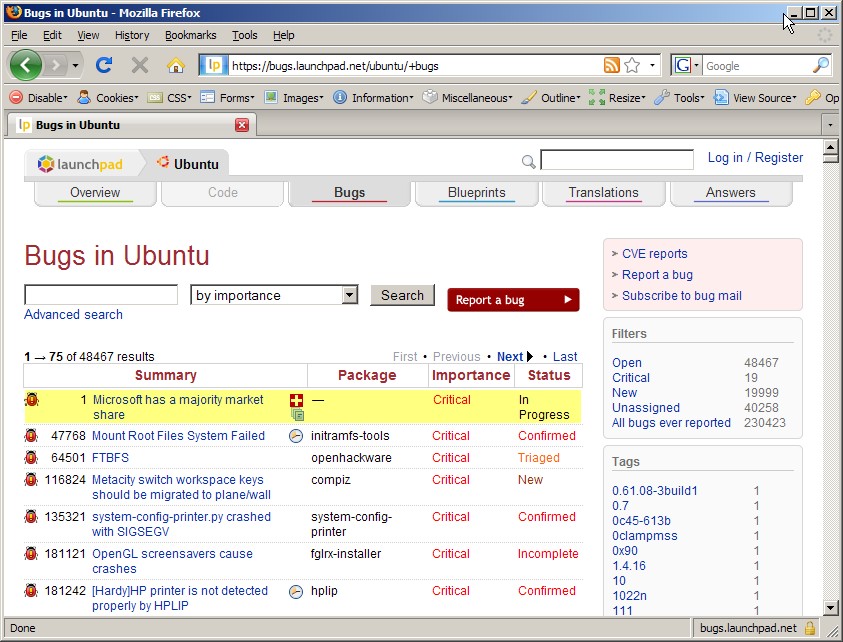Since its launch in October 2004, Ubuntu has been focusing on providing better user experience in the Linux world and has done a very good job. Ubuntu is famous in the Linux distro world for its no-hassle installation, easy and pretty user interface, great package management tool, big community of support, and etc. Especially, its promise of a new release every 6 month indicates its active and fast development and has attracted many users both in the Linux world and in the Windows world. Almost right after the release of its latest version of Ubuntu (Ubuntu 9.04), the Ubuntu development team started the development for the next release of Ubuntu, Ubuntu 9.10 code named Karmic Koala, and the first alpha release is scheduled on May 14th according to their schedule. With this fast development and new features added, will Ubuntu desktop version become a competitor of Windows desktop?
In my humble opinion, it will not. Please let me explain.
As far as the operating system is concerned, Ubuntu is an excellent OS. However, a good OS alone is almost useless. It is the OS plus the software running on the OS that makes the OS attractive. So let’s see how a general user usually uses computer and what Ubuntu OS can provide software wise.
1. Web browsing
Ubuntu has the latest FireFox web browser built in, which makes Ubuntu competitive to Windows in this area, although Windows user has more choices of web browsers (IE, Opera, Safari, etc.)
2. Music and video
Ubuntu comes with Rhythmbox music and Totem video players and they work fine. However, if you don’t like them, there are many other players you can choose from Ubuntu’s software repository. Moreover, RealPlayer has a Linux version, more specifically a Debian package, that can be very easily installed on Ubuntu. Also with the built-in CD/DVD burning software, user can burn CD/DVD without having to pay a penny. So Ubuntu in this area is also competitive to Windows.
3. Productivity tools
Ubuntu comes with Evolution Mail, which can handle email, calendar, contacts, and tasks in one place. The built-in, popular open source instant messaging tool Pidgin IM can connect to most IM services to meet your needs.
4. Photos
Honestly, Ubuntu does not have a good photo management tool. F-Spot Photo Manager is the default photo management tool in Ubuntu, but it is not impressive when comes to features and performance. The good news is, however, that thanks to Wine, the famous Windows emulator in Linux, you can install and run some Windows photo managers in Ubuntu. For example, my favorite photo manager in Windows is FastStone Image Viewer and it can be installed in Ubuntu easily (with Wine) without any special tweaks and runs very well. So I think I can live with it this way, though it will nice to have a good native photo management tool in Ubuntu.
5. Office tools
When it comes to the office suite software, Ubuntu users (or generally speaking, Linux users) don’t have many choices. OpenOffice is the only open source office suite they can choose, and it is included in every Ubuntu release. However, with all respect, OpenOffice cannot compete with Microsoft Office in many ways. Let’s not talk about money here, just the software itself.
a). The user interface of OO 3 has been greatly improved, comparing to OO 2. However, when I compare the UI of OO 3 to MS Office 2007, I have to say that OpenOffice still has a long way to go in order to compete with MS Office just for the UI design.
b). It does not have some nice features as in MS Office. For example, the SmartTag feature in MS Office is very useful. When I do a copy and paste, I can click the SmartTag after paste the text and it will give me soem options to use the desitnation format, or keep the source format, or just use plain text. In OO, you will have to go through several steps to do this: Edit->Paste Special, then choose Unformatted text. Another example is that in MS Office 2007 (Word), when you highlight some text then hover your mouse over the highlighted text, a small menu will pop up with some commonly used formatting menu options. It is very hardy and really speed up the word processing.
c). There are very few templates in OO.
d). The help document in OO is hard to follow, so it is not very helpful.
This post is not about the comparison of OpenOffice and MS Office, so I will stop here. But the bottom line is OpenOffice is still trying to catch up with MS Office. I know many people who tried to switch to Ubuntu, but ended up going back to Windows mostly because they could not stand OpenOffice due to its dull user interface and lack of features and templates.
Therefore, I personally think, even though Ubuntu has become very popular, it is very hard for it to become a competitor of Windows until there is a competitive office suite to MS Office. My suggestion for the Ubuntu development team is to start a OO development branch just for Ubuntu, say called Ubuntu Office, and focus on the improvement of the user experience (don’t worry about other platform) and features to make it a very nice and attractive Ubuntu office suite, believe me, it will soon become a threat to Microsoft Windows.



